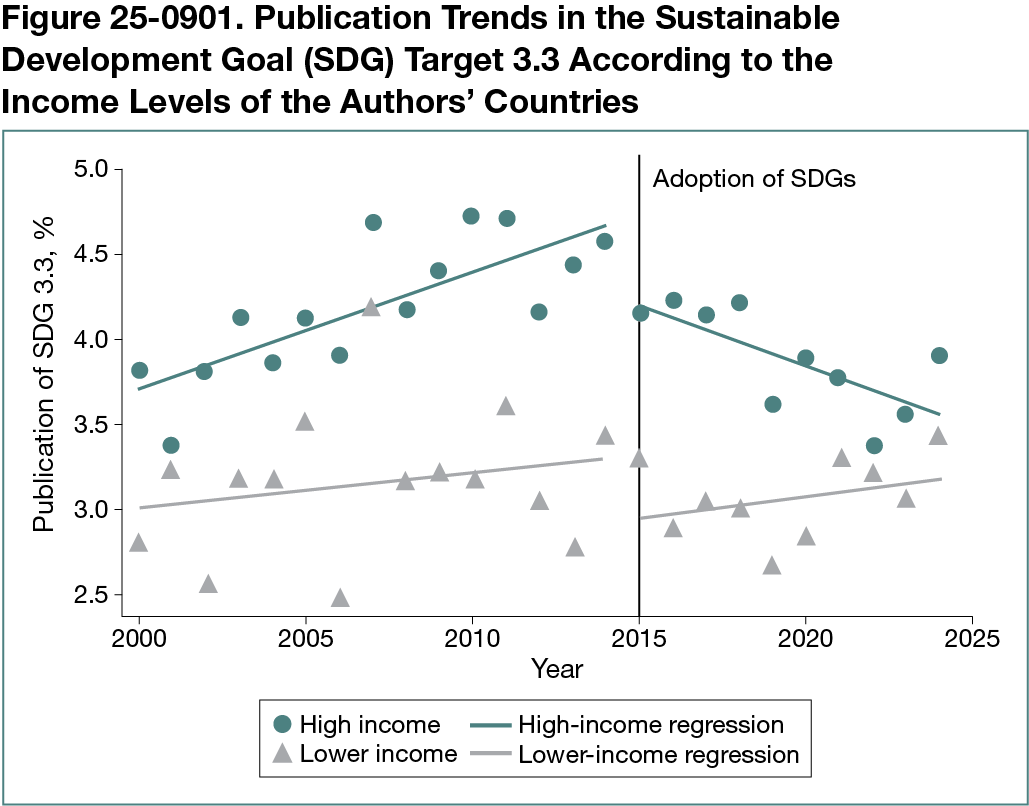Publication Trends in Priority Epidemics According to the Sustainable Development Goals in Pharmaceutical Journals, 2000-2024
Abstract
Julia Soto Rizzato,1 Marcus Tolentino Silva,2 David Moher,3 Tais Freire Galvão1
Objective
To assess publication trends in epidemics estimated to end by 2030 according to the Sustainable Development Goals (SDGs) in pharmaceutical journals in the past 25 years and the association of the adoption of these SDGs in 2015 with this trend. Assessments of the transition from Millennium Development Goals to SDGs are available,1 but investigations are lacking on the impact of the adoption of these SDGs on publications of a specific target.
Design
This cross-sectional study assessed all journals listed in the Pharmacology and Pharmacy category of the Journal Citation Reports. The primary outcome was the proportion of articles published addressing AIDS, tuberculosis, and malaria—epidemics targeted to end according to SDG 3.3. We consulted the Clarivate Web of Science Core Collection on December 19, 2024, to identify the total number of articles and the number of publications in each journal from 2000 to 2024 related to these epidemics. Data on country were collected from Web of Science metadata, which are based on authors’ affiliations and then classified into low-, middle-, or high-income countries based on World Bank country classifications by income level. A paper was considered from a low- or middle-income country if at least 1 author was from 1 of the countries in the metadata. An interrupted time series analysis was conducted to calculate the regression coefficient (β) and 95% CI of the proportion of papers (per 1000 publications) on SDG 3.3 before and after its adoption in 2015. Stata, version 14.2 was used for statistical analyses.
Results
Three hundred fifty-five journals were included, which published 1,313,671 articles, of which 49,687 (3.8%) addressed SDG 3.3 from 2000 to 2024 and 37,521 (2.9%) were published by authors from high-income countries and 12 166 (0.9%) were published by authors from low- and middle-income countries. Between 2000 and 2015, there was an overall growing trend in published papers related to SDG 3.3 (β, 0.47; 95% CI, 0.18-0.76; P = .003), which was more pronounced in developed countries (β, 0.69; 95% CI, 0.38-1.00; P < .001), while the trend from developing countries was not significant (β, 0.21; 95% CI, −0.19 to 0.06; P = .30) (Figure 25-0901). After the adoption of SDGs in 2015, SDG 3.3 publications started to decrease until 2024 (β, −1.00; 95% CI, −1.54 to −0.47; P = .001) in a similar pattern in highincome countries (β, −1.40; 95% CI, −2.00 to −0.81; P < .001), whereas a nonsignificant increase was observed in lower-income countries (β, 0.05; 95% CI, −0.05 to −0.73; P = .89) in the same period.

Conclusions
The adoption of SDGs in 2015 did not seem to affect the publication priorities of pharmaceutical journals until 2024, which indicates that these measures may not have stimulated research efforts and publications. Even when considering that the results indicating research agenda priorities would take a few years to be published, the trend decreased until the end of the series, almost a decade after the adoption of SDGs.
Reference
1. Díaz-López C, Martín-Blanco C, De la Torre Bayo JJ, Rubio-Rivera B, Zamorano M. Analyzing the scientific evolution of the sustainable development goals. Appl Sci. 2021;11(18):8286. doi:0.3390/app11188286
1Faculdade de Ciências Farmacêuticas, Universidade Estadual de Campinas, Campinas, Brazil, taisgalvao@gmail.com; 2Faculdade de Ciências de Saúde, Universidade de Brasília, Brasília, Brazil; 3Centre for Journalology, Methods Centre of the Ottawa Hospital Research Institute, Ottawa, Canada.
Conflict of Interest Disclosures
David Moher and Tais Freire Galvão report being advisory board members of the International Congress on Peer Review and Scientific Publication but were not involved in the review or decision for this abstract. The other authors declare no conflict of interest.
Funding/Support
This study was funded in part by the Coordenação de Aperfeiçoamento de Pessoal de Nível Superior–Brasil (Finance Code 001, granted to Julia Soto Rizzato). Tais Freire Galvão receives a productivity scholarship from the National Council for Scientific and Technological Development (grant 313431/2023-00).
Role of the Funder/Sponsor
The funders had no role in this research.
